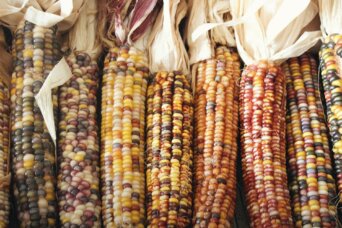- About
- Topics
- Picks
- Audio
- Story
- In-Depth
- Opinion
- News
- Donate
- Signup for our newsletterOur Editors' Best Picks.Send
Read, Debate: Engage.
| topic: | Sustainable Agriculture |
|---|---|
| located: | Mexico |
| editor: | Gerardo Bandera |
“Sin maíz, no hay país,” goes a rhyme in Mexico, meaning “no corn, no country.” The lighthearted jingle is actually quite a veritable statement considering that maize is one of the country’s main staple crops - the total annual production of which weighs in at 27 million metric tonnes - and is Mexican cuisine’s star of the show.
Not only is maize an important economic factor, it is also a heritage crop; maize was originally domesticated by native people of Mexico over 9,000 years ago and continues to be a sacred plant in many indigenous cultures. However, a ‘Reform to the Federal Law of Vegetable Varieties’ (Reforma a la Ley de Variedades Vegetales) threatens to privatise corn seeds and strains, benefitting multinational firms rather than the people the crop feeds.
The amendment, which could pass before the country’s parliament (Cámara de Diputados), implies that it will outlaw the use and exchange of unregistered maize seeds, as is done by indigenous communities and small producers, as well as promote the spread of genetically-modified seeds, which risks contaminating native strains.
Activists fear that this change to the law is a way to muzzle small farms and producers of corn by increasing the market-share of industrialised corn strains, as well as the country’s dependence on just a few multinational corporations. The law also assigns disproportionally high fees for farmers who are found using unregistered or mixed strains of maize, which could place small farmers in financial distress.
As indigenous communities in Mexico have known for thousands of years, monocultures of single-strain crops are distressing for the environment and have a higher risk of crop failure. As Latin America, and the world, faces the drastic effects of climate change, scientists have advocated to prioritise crop diversity to form a more resilient agricultural system that can withstand shifts in environmental factors.
Additional protection should be lent to indigenous communities in Mexico to conserve their traditional agricultural practices, which are mostly responsible for the country’s richness in crop variety.
Moreover, the discussion for any changes to the law must be held in an open and public way, allowing the Mexican people to be informed of the process behind the amendment. The parliament should also hear testimonies from small-scale farmers, indigenous groups and scientific communities to fully understand the implications, social and environmental, that this change could cause.
Image by Jen Theodore

